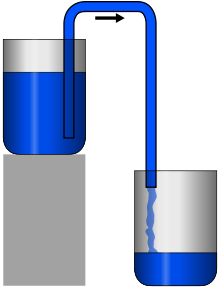siphon
Jump to navigation
Jump to search
See also: Siphon
English[edit]

Alternative forms[edit]
Etymology[edit]
From Middle French siphon, from Old French sifon, from Latin sipho, from Ancient Greek σίφων (síphōn, “pipe, tube”), of uncertain origin; possibly related to Latin tibia (“pipe, flute of bone”), with the irregular forms suggesting a non-Indo-European loan source, perhaps of the shape *twi-, *twibh.
Pronunciation[edit]
Noun[edit]
siphon (plural siphons)
- A bent pipe or tube with one end lower than the other, in which hydrostatic pressure exerted due to the force of gravity moves liquid from one reservoir to another.
- A soda siphon.
- (zoology) A tubelike organ found in animals or elongated cell found in plants.
Derived terms[edit]
Translations[edit]
bent pipe or tube with one end lower than the other
|
tubelike organ found in animals or elongated cell found in plants
Verb[edit]
siphon (third-person singular simple present siphons, present participle siphoning, simple past and past participle siphoned)
- (transitive) To transfer (liquid) by means of a siphon.
- He used a rubber tube to siphon petrol from the car's fuel tank.
- (transitive, figurative, often with "off") To steal or skim off money in small amounts; to embezzle.
Derived terms[edit]
Translations[edit]
transfer by means of a siphon
steal or skim off in small amounts
See also[edit]
References[edit]
- Roberts, Edward A. (2014) A Comprehensive Etymological Dictionary of the Spanish Language with Families of Words based on Indo-European Roots, Xlibris Corporation, →ISBN
Anagrams[edit]
French[edit]
Etymology[edit]
From Latin sīphō from Ancient Greek σίφων (síphōn, “pipe, tube”), of unknown ultimate origin.
Pronunciation[edit]
Audio (file)
Noun[edit]
siphon m (plural siphons)
Derived terms[edit]
Further reading[edit]
- “siphon”, in Trésor de la langue française informatisé [Digitized Treasury of the French Language], 2012.
Categories:
- English terms derived from Middle French
- English terms derived from Old French
- English terms derived from Latin
- English terms derived from Ancient Greek
- Rhymes:English/aɪfən
- Rhymes:English/aɪfən/2 syllables
- English 2-syllable words
- English terms with IPA pronunciation
- English terms with audio links
- English lemmas
- English nouns
- English countable nouns
- en:Zoology
- English verbs
- English transitive verbs
- English terms with usage examples
- French terms derived from Latin
- French terms derived from Ancient Greek
- French terms with audio links
- French lemmas
- French nouns
- French countable nouns
- French masculine nouns

